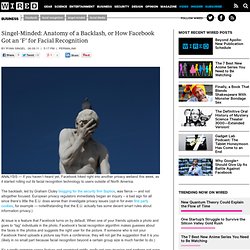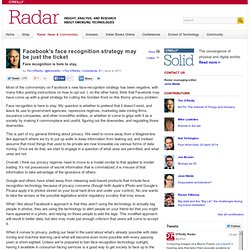

Facebook starts rolling out facial recognition feature worldwide. Late last year, Facebook started rolling a facial recognition feature across the US.

Now, the company has pushed the Tag Suggestions feature to countries outside of the US, but has switched it on by default without telling its users first. When you upload new photos, Facebook uses software similar to that found in many photo editing tools to match your new photos to other photos you're tagged in. Similar photos are grouped together and, whenever possible, Facebook suggests the name(s) your friend(s) in the photos.
In other words, the square that magically finds faces in a photo now suggests names of your Facebook friends to streamline the tagging process, especially with the same friends in multiple uploaded photos. When the new feature was introduced in the US, Facebook pointed out that users could disable it in their Privacy Settings. Facebook shouldn't require you to constantly check your Privacy Settings to see what the company has changed since your last visit to the site. Facebook changes privacy settings for millions of users – facial recognition is enabled. Singel-Minded: Anatomy of a Backlash, or How Facebook Got an ‘F’ for Facial Recognition. ANALYSIS — If you haven’t heard yet, Facebook hiked right into another privacy wetland this week, as it started rolling out its facial recognition technology to users outside of North America.

The backlash, led by Graham Cluley blogging for the security firm Sophos, was fierce — and not altogether focused. European privacy regulators immediately began an inquiry – a bad sign for all since there’s little the E.U. does worse than investigate privacy issues (opt-in for even first party cookies, for example — notwithstanding that the E.U. actually has some decent smart rules about information privacy.) At issue is a feature that Facebook turns on by default. When one of your friends uploads a photo and goes to “tag” individuals in the photo, Facebook’s facial recognition algorithm makes guesses about the faces in the photos and suggests the right user for the picture. It’s a pretty common-sense feature and examined coldly, really not very invasive and perhaps not even that useful. Facebook's face recognition strategy may be just the ticket. Most of the commentary on Facebook’s new face-recognition strategy has been negative, with many folks posting instructions on how to opt out.

I, on the other hand, think that Facebook may have come up with a great strategy for cutting the Gordian Knot on this thorny privacy problem. Face recognition is here to stay. My question is whether to pretend that it doesn’t exist, and leave its use to government agencies, repressive regimes, marketing data mining firms, insurance companies, and other monolithic entities, or whether to come to grips with it as a society by making it commonplace and useful, figuring out the downsides, and regulating those downsides. This is part of my general thinking about privacy. We need to move away from a Maginot-line like approach where we try to put up walls to keep information from leaking out, and instead assume that most things that used to be private are now knowable via various forms of data mining.
Related: